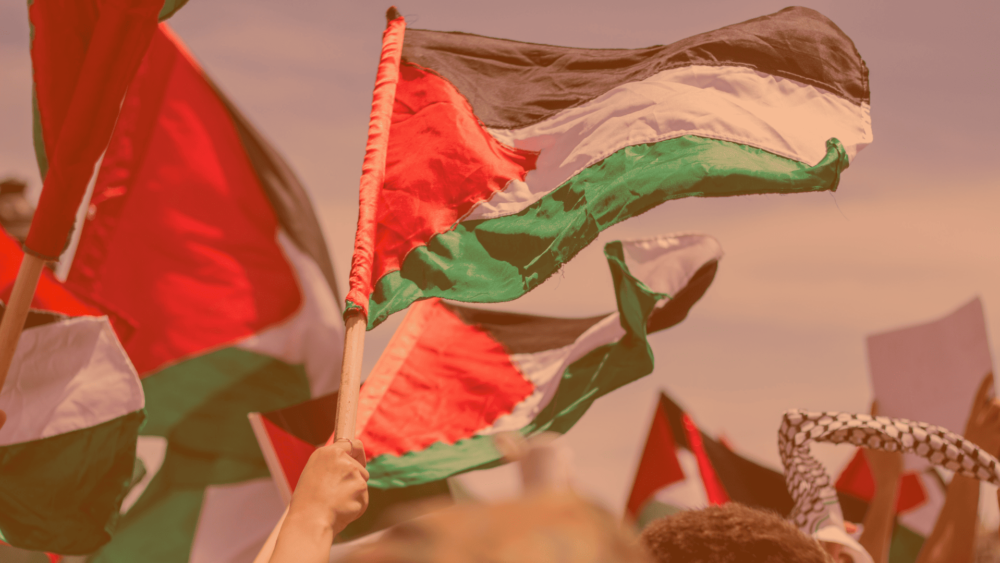Since 1978, November 29 marks the International Day of Solidarity with the Palestinian People. For the international community, this day is a yearly reminder to mark the anniversary of the UN General Assembly Resolution 181 and to recall its efforts to grant the Palestinians their sovereignty and independence from Israeli occupation. For the Palestinian people, however, this day is more likely a yearly reminder of one thing only: how the international community has failed and continues to fail them.
Whether it’s the ongoing system of apartheid, the ethnic cleansing and other acts of genocide, or Israel’s impunity and ongoing support from its European and global allies, the crisis of international law and accountability is currently not illustrated any clearer and more tragically than in the shameful mistreatment of the Palestinian people.
Yet, despite or because of our political decision-makers’ failure, solidarity with the Palestinian people has been continuously and loudly expressed in word and action by civil society actors, grassroots activists, and transnational movements all over the world. For DiEM25, solidarity with the Palestinian people and their fight for liberation and dignity has been a fundamental element of its work since its inception. Rooted in thorough discussions and summarised in the movement’s policy stance from 2021, the commitment to Palestinian liberation has guided its work, both on the level of policy formulation and activism. Whether it is DiEM25’s effort to end the siege on Gaza and end Israeli apartheid, to suspend Israel from International Sports, or to stop trade with settlements, for us, solidarity with the Palestinian people is not something acknowledged or expressed once a year. Solidarity is lived on a daily basis, and this will not change. Therefore, to not drown in cynicism and despair, let’s use this day as a moment for reflection on what solidarity with the Palestinian people could or should look like.
Here are the ways we can better express solidarity with the Palestinian people:
1. Centre Palestinian voices
As much as it is fundamental to support the Palestinian people in their fight for liberation, it is their fight to fight. This does not exclude our responsibility, but it means that our solidarity should centre Palestinian voices by supporting the needs, ideas, and initiatives brought forward by the Palestinian people themselves. The Palestinians have a long history of organising and mobilising for their liberation and it’s essential for us to acknowledge this and listen. Solidarity means not utilising their struggle for our cause, but instead to utilise our cause for their liberation. It also means speaking with Palestinians, not just about them.
2. Actively oppose the dehumanisation of Palestinians
The impunity with which Israel and its allies have killed and displaced Palestinians for more than 75 years is a direct result of decades of dehumanisation. In mainstream discourses, Palestinians are either ignored, represented as numbers, or depicted as hateful monsters. Solidarity means to disrupt this narrative and talk about Palestinians as what they are: a historic people full of rich cultural and political history and diversity, comprised of individuals with their very own names, families, histories, lives, struggles, ideas and dreams. And while focusing on the suffering of Palestinian women and children might seem like a strategically effective way to oppose the dehumanisation of the Palestinian people, true re-humanization necessitates us to not ignore all the Palestinian fathers, brothers, uncles, grandfathers, cousins, and sons living and dying every day for the liberation of their people.
3. Educate ourselves and others
While discourses are biased, narratives constructed, and contexts distorted, all information and knowledge required for supporting the liberation of the Palestinian people are out there. Solidarity means to proactively educate ourselves and others about the long history of the Palestinian struggle. It means to learn about the differing lived realities of the people inside and outside of Palestine, their varying spaces for agency, and their very specific needs for support. And it means to share this knowledge with the people around us in order to actively change the dominant discourse and to mobilise widespread opposition.
4. To call out hypocrisy wherever we encounter it
Solidarity with the Palestinian people also means to highlight how their struggle for liberation is deeply connected with the other systems of oppression that we fight every single day. The last year has once again illustrated the double-standards and selectiveness of applying international law and human rights. Whether it is the active support of Western governments, the passive complicity of many governments in the region, or the instrumentalization of the situation for strategic reasons: the international community reeks of hypocrisy. Solidarity with the Palestinian people therefore means to call out this hypocrisy wherever we encounter it and to oppose the instrumentalization of Palestinian suffering for political agendas. Solidarity requires integrity and consistency.
5. To turn words of solidarity into action
As the commemoration of the International Day of Solidarity with the Palestinian People makes painfully obvious: words of solidarity mean nothing without actions of solidarity. It is thus fundamental for DiEM25 to continue translating its solidarity into action: to educate, to engage, to organise, to mobilise, to support, to network, to exchange, to provide space, to disrupt, to petition, to vote and ultimately, to act. Whether it’s through local initiatives and protests, MERA25’s work (e.g., during the upcoming federal elections in Germany), DiEM25-internal collectives (e.g., the Peace Collective’s subgroup on Palestine), participation in the discussion and voting of All Members Votes (e.g., on DiEM25’s support to BDS): in solidarity with the Palestinian people and their liberation – every single day.
Do you want to be informed of DiEM25's actions? Sign up here















